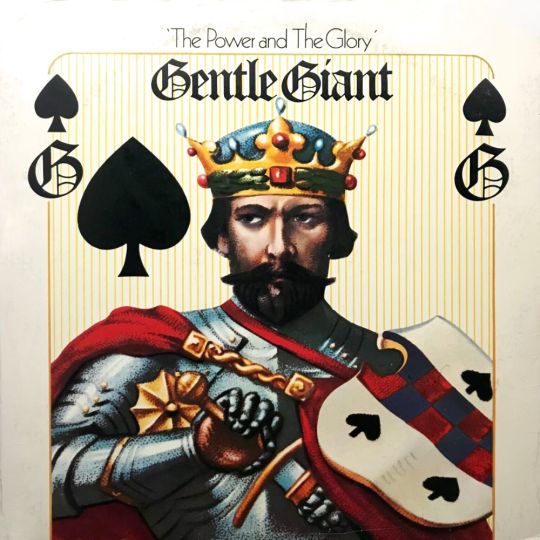#The Power and the Glory
Text
Badly Summarised WIP Poll
Thanks for tagging me, @autumnalwalker! :D
Rules: Pick a bunch of your WIPs and summarize them as badly as possible, then ask your followers to vote on which one they'd be most likely to read. Multiple/all/none options are completely optional.
Tagging @sam-glade, @sarandipitywrites, @akindofmagictoo, @oh-no-another-idea, and anyone else who wants to do this! :D Also tagging @blind-the-winds, who started this tag game chain and asked to be tagged by others who do it.
#tag game#polls#my polls#writing#my WIPs#in order these WIPs are:#the power and the glory#totentanz#like snow on hungry graves#the circle of little animals#the unfortunate moth#uneasy money#silver glass#death waits for some men
17 notes
·
View notes
Text
The Power and the Glory
By Charles Willard Diffin
Originally published July 1930, in the magazine, Astounding Stories of Super-Science.
[Sadly, sternly, the old professor reveals to his brilliant pupil the greater path to glory]
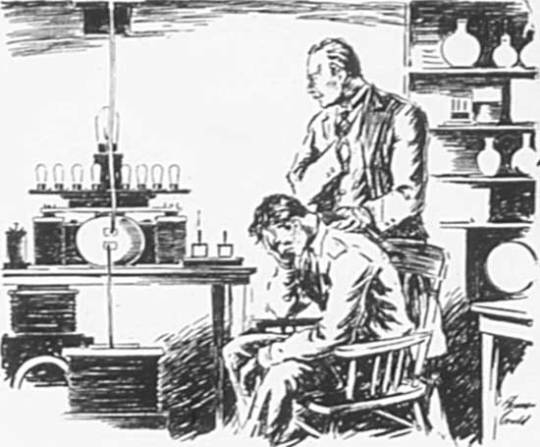
[ID: A black and white illustration showing a young man siting in a chair in front of a table of scientific equipment, his head in one hand in despair, while an older man stands above him with his hand on the younger man's shoulder consolingly, his other wrist held across his chest, showing he is missing that hand. End ID.]
There were papers on the desk, a litter of papers scrawled over, in the careless writing of indifferent students, with the symbols of chemistry and long mathematical computations. The man at the desk pushed them aside to rest his lean, lined face on one thin hand. The other arm, ending at the wrist, was on the desk before him.
Students of a great university had long since ceased to speculate about the missing hand. The result of an experiment, they knew—a hand that was a mass of lifeless cells, amputated quickly that the living arm might be saved—but that was some several years ago, ancient history to those who came and went through Professor Eddinger's class room.
And now Professor Eddinger was weary—weary and old, he told himself—as he closed his eyes to shut out the sight of the interminable papers and the stubby wrist that had ended forever his experiments and the delicate manipulations which only he could do.
He reached slowly for a buzzing phone, but his eyes brightened at the voice that came to him.
"I've got it—I've got it!" The words were almost incoherent. "This is Avery, Professor—Avery! You must come at once. You will share in it; I owe it all to you ... you will be the first to see ... I am sending a taxi for you—"
Professor Eddinger's tired eyes crinkled to a smile. Enthusiasm like this was rare among his youngsters. But Avery—with the face of a poet, a dreamer's eyes and the mind of a scientist—good boy, Avery!—a long time since he had seen him—had him in his own laboratory for two years....
"What's this all about?" he asked.
"No—no!" said a voice; "I can't tell you—it is too big—greater than the induction motor—greater than the electric light—it is the greatest thing in the world. The taxi should be there now—you must come—"
A knock at the office door where a voice said, "Car for Professor Eddinger," confirmed the excited words.
"I'll come," said the Professor, "right away."
He pondered, as the car whirled him across the city, on what this greatest thing in the world might be. And he hoped with gentle skepticism that the enthusiasm was warranted. A young man opened the car door as they stopped. His face was flushed, Eddinger noted, hair pushed back in disarray, his shirt torn open at the throat.
"Wait here," he told the driver and took the Professor by the arm to hurry him into a dilapidated building.
"Not much of a laboratory," he said, "but we'll have better, you and I; we'll have better—"
The room seemed bare with its meager equipment, but it was neat, as became the best student of Professor Eddinger. Rows of reagent bottles stood on the shelves, but the tables were a litter of misplaced instruments and broken glassware where trembling hands had fumbled in heedless excitement.
"Glad to see you again, Avery." The gentle voice of Professor Eddinger had lost its tired tone. "It's been two years you've been working, I judge. Now what is this great discovery, boy? What have you found?"
The younger man, in whose face the color came and went, and whose eyes were shining from dark hollows that marked long days and sleepless nights, still clung to the other's arm.
"It's real," he said; "it's great! It means fortune and fame, and you're in on that, Professor. The old master," he said and clapped a hand affectionately upon a thin shoulder; "I owe it all to you. And now I have—I have learned.... No, you shall see for yourself. Wait—"
He crossed quickly to a table. On it was an apparatus; the eyes of the older man widened as he saw it. It was intricate—a maze of tubing. There was a glass bulb above—the generator of a cathode ray, obviously—and electro-magnets below and on each side. Beneath was a crude sphere of heavy lead—a retort, it might be—and from this there passed two massive, insulated cables. The understanding eyes of the Professor followed them, one to a terminal on a great insulating block upon the floor, the other to a similarly protected terminal of carbon some feet above it in the air.
The trembling fingers of the young man made some few adjustments, then he left the instrument to take his place by an electric switch. "Stand back," he warned, and closed the switch.
There was a gentle hissing from within glass tubes, the faint glow of a blue-green light. And that was all, until—with a crash like the ripping crackle of lightning, a white flame arced between the terminals of the heavy cables. It hissed ceaselessly through the air where now the tang of ozone was apparent. The carbon blocks glowed with a brilliant incandescence when the flame ceased with the motion of a hand where Avery pulled a switch.
The man's voice was quiet now. "You do not know, yet, what you have seen, but there was a tremendous potential there—an amperage I can't measure with my limited facilities." He waved a deprecating hand about the ill-furnished laboratory. "But you have seen—" His voice trembled and failed at the forming of the words.
"—The disintegration of the atom," said Professor Eddinger quietly, "and the release of power unlimited. Did you use thorium?" he inquired.
The other looked at him in amazement. Then: "I should have known you would understand," he said humbly. "And you know what it means"—again his voice rose—"power without end to do the work of the world—great vessels driven a lifetime on a mere ounce of matter—a revolution in transportation—in living...." He paused. "The liberation of mankind," he added, and his voice was reverent. "This will do the work of the world: it will make a new heaven and a new earth! Oh, I have dreamed dreams," he exclaimed, "I have seen visions. And it has been given to me—me!—to liberate man from the curse of Adam ... the sweat of his brow.... I can't realize it even yet. I—I am not worthy...."
He raised his eyes slowly in the silence to gaze in wondering astonishment at the older man. There was no answering light, no exaltation on the lined face. Only sadness in the tired eyes that looked at him and through him as if focused upon something in a dim future—or past.
"Don't you see?" asked the wondering man. "The freedom of men—the liberation of a race. No more poverty, no endless, grinding labor." His young eyes, too, were looking into the future, a future of blinding light. "Culture," he said, "instead of heart-breaking toil, a chance to grow mentally, spiritually; it is another world, a new life—" And again he asked: "Surely, you see?"
"I see," said the other; "I see—plainly."
"The new world," said Avery. "It—it dazzles me; it rings like music in my ears."
"I see no new world," was the slow response.
The young face was plainly perplexed. "Don't you believe?" he stammered. "After you have seen ... I thought you would have the vision, would help me emancipate the world, save it—" His voice failed.
"Men have a way of crucifying their saviors," said the tired voice.
The inventor was suddenly indignant. "You are blind," he said harshly; "it is too big for you. And I would have had you stand beside me in the great work.... I shall announce it alone.... There will be laboratories—enormous!—and factories. My invention will be perfected, simplified, compressed. A generator will be made—thousands of horsepower to do the work of a city, free thousands of men—made so small you can hold it in one hand."
The sensitive face was proudly alight, proud and a trifle arrogant. The exaltation of his coming power was strong upon him.
"Yes," said Professor Eddinger, "in one hand." And he raised his right arm that he might see where the end of a sleeve was empty.
"I am sorry," said the inventor abruptly; "I didn't mean ... but you will excuse me now; there is so much to be done—" But the thin figure of Professor Eddinger had crossed to the far table to examine the apparatus there.
"Crude," he said beneath his breath, "crude—but efficient!"
In the silence a rat had appeared in the distant corner. The Professor nodded as he saw it. The animal stopped as the man's eyes came upon it; then sat squirrellike on one of the shelves as it ate a crumb of food. Some morsel from a hurried lunch of Avery's, the Professor reflected—poor Avery! Yes, there was much to be done.
He spoke as much to himself as to the man who was now beside him. "It enters here," he said and peered downward toward the lead bulb. He placed a finger on the side of the metal. "About here, I should think.... Have you a drill? And a bit of quartz?"
The inventor's eyes were puzzled, but the assurance of his old instructor claimed obedience. He produced a small drill and a fragment like broken glass. And he started visibly as the one hand worked awkwardly to make a small hole in the side of the lead. But he withdrew his own restraining hand, and he watched in mystified silence while the quartz was fitted to make a tiny window and the thin figure stooped to sight as if aiming the opening toward a far corner where a brown rat sat upright in earnest munching of a dry crust.
The Professor drew Avery with him as he retreated noiselessly from the instrument. "Will you close the switch," he whispered.
The young man hesitated, bewildered, at this unexpected demonstration, and the Professor himself reached with his one hand for the black lever. Again the arc crashed into life, to hold for a brief instant until Professor Eddinger opened the switch.
"Well," demanded Avery, "what's all the show? Do you think you are teaching me anything—about my own instrument?" There was hurt pride and jealous resentment in his voice.
"See," said Professor Eddinger quietly. And his one thin hand pointed to a far shelf, where, in the shadow, was a huddle of brown fur and a bit of crust. It fell as they watched, and the "plop" of the soft body upon the floor sounded loud in the silent room.
"The law of compensation," said Professor Eddinger. "Two sides to the medal! Darkness and light—good and evil—life ... and death!"
The young man was stammering. "What do you mean?—a death ray evolved?" And: "What of it?" he demanded; "what of it? What's that got to do with it?"
"A death ray," the other agreed. "You have dreamed, Avery—one must in order to create—but it is only a dream. You dreamed of life—a fuller life—for the world, but you would have given them, as you have just seen, death."
The face of Avery was white as wax; his eyes glared savagely from dark hollows.
"A rat!" he protested. "You have killed a rat ... and you say—you say—" He raised one trembling hand to his lips to hold them from forming the unspeakable words.
"A rat," said the Professor—"or a man ... or a million men."
"We will control it."
"All men will have it—the best and the worst ... and there is no defence."
"It will free the world—"
"It will destroy it."
"No!"—and the white-faced man was shouting now—"you don't understand—you can't see—"
The lean figure of the scientist straightened to its full height. His eyes met those of the younger man, silent now before him, but Avery knew the eyes never saw him; they were looking far off, following the wings of thought. In the stillness the man's words came harsh and commanding—
"Do you see the cities," he said, "crumbling to ruins under the cold stars? The fields? They are rank with wild growth, torn and gullied by the waters; a desolate land where animals prowl. And the people—the people!—wandering bands, lower, as the years drag on, than the beasts themselves; the children dying, forgotten, in the forgotten lands; a people to whom the progress of our civilization is one with the ages past, for whom there is again the slow, toiling road toward the light.
"And somewhere, perhaps, a conquering race, the most brutal and callous of mankind, rioting in their sense of power and dragging themselves down to oblivion...."
His gaze came slowly back to the room and the figure of the man still fighting for his dream.
"They would not," said Avery hoarsely; "they'd use it for good."
"Would they?" asked Professor Eddinger. He spoke simply as one stating simple facts. "I love my fellow men," he said, "and I killed them in thousands in the last war—I, and my science, and my poison gas."
The figure of Avery slumped suddenly upon a chair; his face was buried in his hands. "And I would have been," he groaned, "the greatest man in the world."
"You shall be greater," said the Professor, "though only we shall know it—you and I.... You will save the world—from itself."
The figure, bowed and sunken in the chair, made no move; the man was heedless of the kindly hand upon his shoulder. His voice, when he spoke, was that of one afar off, speaking out of a great loneliness. "You don't understand," he said dully; "you can't—"
But Professor Eddinger, a cog in the wheels of a great educational machine, glanced at the watch on his wrist. Again his thin shoulders were stooped, his voice tired. "My classes," he said. "I must be going...."
In the gathering dusk Professor Eddinger locked carefully the door of his office. He crossed beyond his desk and fumbled with his one hand for his keys.
There was a cabinet to be opened, and he stared long in the dim light at the object he withdrew. He looked approvingly at the exquisite workmanship of an instrument where a generator of the cathode ray and an intricate maze of tubing surmounted electro-magnets and a round lead bulb. There were terminals for attaching heavy cables; it was a beautiful thing.... His useless arm moved to bring an imaginary hand before the window of quartz in the lead sphere.
"Power," he whispered and repeated Avery's words; "power, to build a city—or destroy a civilization ... and I hold it in one hand."
He replaced the apparatus in the safety of its case. "The saviors of mankind!" he said, and his tone was harsh and bitter.
But a smile, whimsical, kindly, crinkled his tired eyes as he turned to his desk and its usual litter of examination papers.
"It is something, Avery," he whispered to that distant man, "to belong in so distinguished a group."
#science fiction#scifi#1930s#The Power and the Glory#Atomic energy#vintage scifi#Charles Diffin#Charles Willard Diffin#short stories#cannonically disabled characters#disabled characters#physically disabled characters#crippled characters#canon cripple characters#canon disabled characters#canon physically disabled characters#amputee characters#canon amputee characters#Professor Eddinger#Public domain characters#public domain stories#public domain#animal death#fictional animal death#long post
8 notes
·
View notes
Text
Finished the Power and the Glory by Graham Greene
Its a bit interesting how this book parallels and has similar ideas of Silence by Shusaku Endo. Although some parts do feel inverted in a way. The main characters feel for example almost inverted opposites of each other.
Rodriguez (Silence) is an outwardly good priest who struggles with his own pride and wants to become a martyr. And he believes he can help make a difference to the believers in Japan. He ends the story, believing he has a better understanding of God. (Which I don't believe is actually true.)
Meanwhile The Whisky Priest from The Power and the Glory. Doesn't want to become a martyr or a Saint and continually thinks of himself as pathetic. And his sin is outward. He's a drinks so often he smells and he has a illegitimate daughter. He also ends the story thinking he's a terrible priest.
Spoilers under the cut
However of the two protagonist, it's the Whisky Priest who remains faithful to Christianity in the end. And successes in his calling as a priest. The final chapter shows some of the people who the Whisky Priest encountered and how in small ways they changed. Showing that he did in fact change people. And the most important part he begs for forgiveness in his final chapter. He doesn't think he's worthy of it but he asks all the same.
Meanwhile in Silence. Rodriguez doesn't seem to overcome his pride in the in of the novel and fails as a Catholic priest. He does have a better understanding of God but is never shown to repeat after stepping on the Fume. He seems to just include that in his Martyr complex. Saying he knows more than the priest back home. He is still in sin but thinks it makes him better.
Both characters don't end in happy situations However only one of them ask God for forgiveness in his final moment.
#silence by shusaku endo#silence#shusaku endo#Catholic Novel#christian literature#japanese literature#graham greene#Don't really have a point to this#Just something I thought about#The Power and the Glory
3 notes
·
View notes
Text
Last year, I picked up Graham Greene's The Power and the Glory fully expecting to trudge through--but instead I found myself staying up late to finish it, and it ended up being one of the top books I read that year. There is no hero in this book--and yet, there is. The book doesn't shy away from humanity's ugly parts; instead, it looks them directly in the face and insists that you look at them too. It takes conventional wisdom about religion and God and asks what, in the midst of the filth of evil and humanity's corruption, does this actually mean?
And to be honest, some of its answers are frightening. The story doesn't sugarcoat religion at all. The main character is, after all, a drunken priest with an illegitimate daughter. Yet somehow, its observations have more staying power than any treacly passage about the beauty of virtue.
A few of my favorite quotes:
"But at the centre of his own faith there always stood the convincing mystery--that we were made in God's image. God was the parent, but He was also the policeman, the criminal, the priest, the manaic, and the judge. Something resembling God dangled from the gibbet."
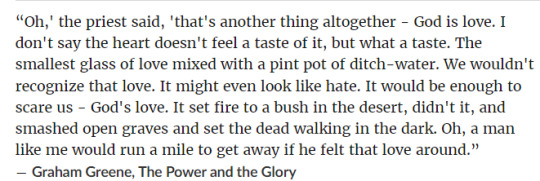
3 notes
·
View notes
Text
The Power and The Glory 7.10
Guess what's back! It's Heresiarch! Finally got out of the rut and should be returning to a more regular schedule. Since Twitter turned into a trashfire literally moments after I touched it, I'll also be posting about updates here. If you want to start Heresiarch, you can find chapter one here.
Also, to entice people, I've decided to start including excerpts from chapters as a bit of a preview:
"Indeed, in general one will find that the chief challenge of necrourgy after the base skill of refinement is understood is the proper and safe acquisition of the base materials of the process. I have no qualms with grave-robbing. I have only once in my career had a cadaver complain about my attempts at practicing my craft, and that was because the body I had recovered was in fact mistaken as dead when in actuality she was merely asleep. Their relatives, on the other hand, have made several issues with my practice. I broadly disagree with this sentiment."
3 notes
·
View notes
Photo
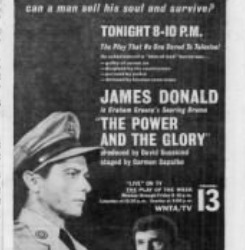
2 notes
·
View notes
Text
The Power and the Glory is very much one of those novels that should have been a short story :/
#It's so long#And so repetitive#Like we got your point Greene#We got it three hours ago#And I'm listening on 1.3 speed ;-;#And there are still three hours to go#The power and the Glory#graham greene
1 note
·
View note
Text

I read this book when I was a young teen. I liked it back then but didn’t really get it. Am just re-reading it now and enjoying it far more then I did in the past.
Have read many Graham Greene books. Including the espionage ones, the thriller ones with spies and so on. They are good as well. I think Greene is at his best when he writes in the literary genre. Brighton Rock and this one ^, I believe show his finest abilities. Just an opinion. Would recommend.
0 notes
Photo
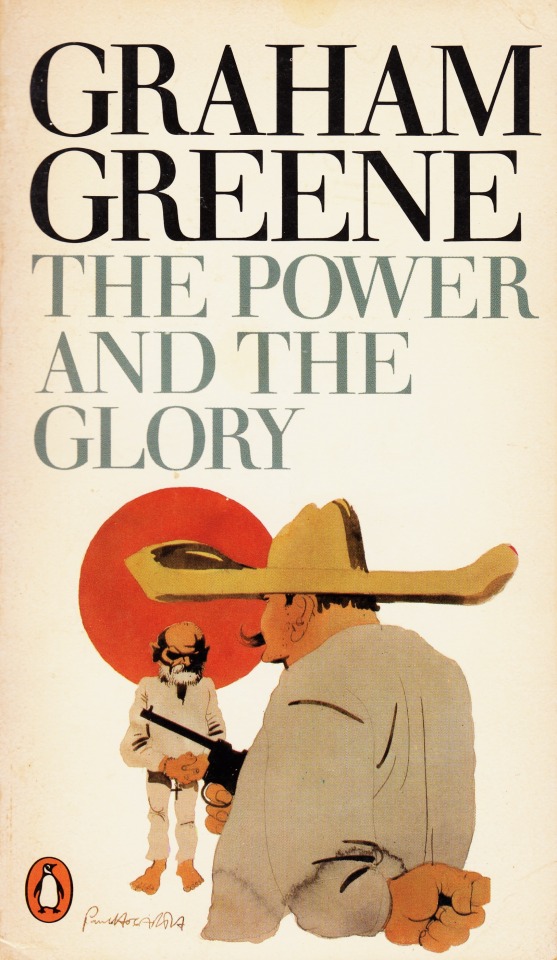
The Power And The Glory (1940)
Graham Greene
Penguin Books
0 notes
Text
The Bad Ends
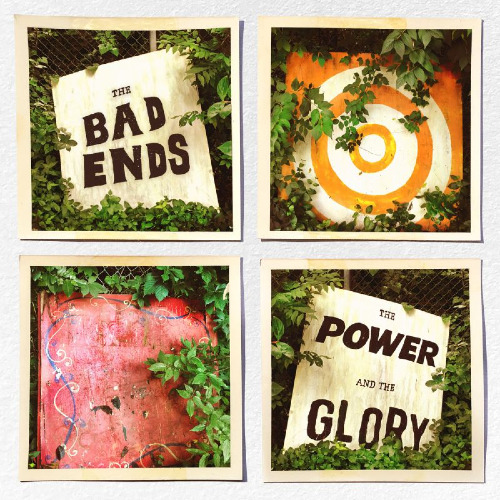
The Power And The Glory (2023)
… from Athens, GA …
#TheBadEnds
0 notes
Text
The Bad Ends: From One Extreme to the Other

Photo by Jason Thrasher
BY JORDAN MAINZER
“I’m not going to shy away from the absolute most unthinkable thing that can happen,” Mike Mantione told me over the phone late last year. The vocalist and guitarist from Five Eight was speaking about The Bad Ends, his new band with former R.E.M. drummer Bill Berry, bassist/vocalist Dave Domizi, Josh Joplin Group keyboard player Geoff Melkonian, and guitarist/mandolinist Christian Lopez, all fixtures of the Athens and Atlanta music scenes. It’s a strange thing to say when talking about a new project, one who after sitting on it for five years released its debut album, The Power And The Glory, last Friday via New West. Plus, our interview was the day after The Bad Ends had played their first ever show at Nuci’s Space. But Mantione isn’t afraid to "meet face-on” where The Power And The Glory came from, which is a lot of death and depression.
Originally meant to be a solo record for Mantione, The Power And The Glory was born out of outward suffering, written in context of what Mantione admits were “like 4 deaths,” from friends to family members, from natural causes to suicide. The number is irrelevant, and it’s darkly, comically not exact, fitting for the types of songs that pervade the album. Lead single “All Your Friends Are Dying” is The Bad Ends in a nutshell: its lyrics and video contain a who’s who of Athens-based musicians, and its instrumentation sports a melancholy jangle that’s celebratory at the same time. “All your friends are dying,” sings Mantione, following it up with a whoop, on the surface macabre but in essence a celebration of life, a reminder of its volatility and the aging process and to get out and do things. “Honestly” sees Mantione listening to and reflecting on old records and associating with a friend who had passed. Stunning closer “New York Murder-Suicide” transposes a true crime-level story from Mantione’s wife’s family onto his own late immobile uncle and aunt with dementia, imagining them killing themselves. Featuring just his voice and tremolo guitar playing, it’s stark and serious. But hearing that Mantione actually got to play the song for his uncle--someone who told Mantione to “always keep going, never stop”--gives the song a tad bit of levity, and maybe makes it heartwarming in a twisted way.
On paper, the subject matter of the songs on The Power And The Glory seem better suited to a devastating singer-songwriter record. When Melkonian produced Five Eight’s 2004 self-titled album, the plan was for him to produce Mantione’s eventual solo album and to have a different set of musicians on every two songs. The first set of musicians, in addition to Melkonian, was Berry, Lopez, and Domizi, at which point Mantione knew this was the only band. Fittingly, the venue where The Bad Ends played their first show also confronts the realities of being a working musician and a human. Nuci’s Space, founded by the family of Nuçi Phillips, a musician who took his own life, seeks to end the suicide epidemic and the stigma attached to brain illnesses by providing a space for musicians to get support and affordable treatment. More, in 2013, Nuci’s Space acquired ownership of the “R.E.M. steeple,” all that’s left of the church where the Rock and Roll Hall of Famers played their first ever show. That a lot of The Power And The Glory deals with grief and is Berry’s first album since he left R.E.M. makes The Bad Ends seem like a destiny more than a fun fact.
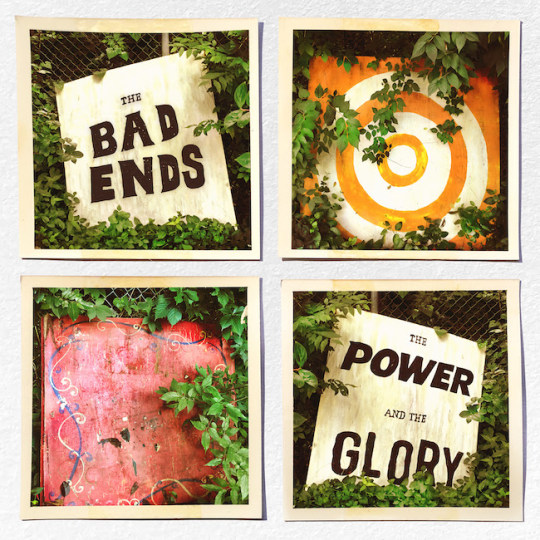
Ultimately, The Power And The Glory is about perspectives. A song like “Mile Marker 29″, written during a family camping trip to witness the 2017 Solar Eclipse, is a hard-charging rocker that sees Mantione making the difficult decision to leave behind a depressed friend that’s bringing him down. “I’m getting frustrated with someone who isn’t taking part,” Mantione said of the song. “It’s very sad: There’s this amazing world that’s awesome if you look at it. There’s just a minivan and a family, and it drives anywhere you imagine.” “The Ballad of Satan’s Bride” is a fictional story about a guy who dies in the arms of his newlywed, whose been drunkenly seduced by Satan, its tragedy belied by the song’s fun volume and pace. Most importantly, it doesn’t really judge any of the characters. “None of us are perfect,” Mantione said. “We’re all sitting with whatever we’re sitting with. Music enables us to integrate it, to make sense of so many odd years on this planet that’s sublimely beautiful at the same time. If you open your eyes and look, you’ll be bouncing from one extreme to the other.”
The Bad Ends celebrate the release of The Power And The Glory Saturday at Athens’ legendary 40 Watt Club playing the album front to back. (No, they wont be featuring actual strings when playing the Berry-penned mid-album instrumental “Ode to Jose”.) A.D. Blanco headlines the night, and Pylon Reenactment Society and Lo Talker open. Doors at 7 PM EST, music at 8. Tickets still available at the time of publishing.
#the bad ends#interviews#live picks#jason thrasher#mike mantione#dave domizi#Geoff Melkonian#new west#nuci's space#40 watt club#vanessa briscoe hay#jason nesmith#kay stanton#the power and the glory#five eight#r.e.m.#bill berry#josh joplin group#christian lopez#new west records#Nuçi Phillips#a.d. blanco#pylon reenactment society#lo talker
0 notes
Audio
4:52 AM EST January 16, 2023:
Gentle Giant - “So Sincere”
From the album The Power and the Glory
(September 20, 1974)
Last song scrobbled from iTunes at Last.fm
The darkest, and therefore probably my favorite, Gentle Giant album
0 notes
Text
4 year old Ahmad Shabat - an israeli airstrike hit him, his parents & 4 siblings; he survived, they didn't - then they hit him & his father's relatives; he survived, they didn't - then they hit him & his uncle; he survived, his uncle didn't - both of Ahmed's legs have been amputated because of injuries. He survives.


i hope Ahmad gets to live. i hope he has a beautiful and fulfilling life. i hope he finds love and safety and comfort and success. i hope he finds happiness. i hope he heals. i hope he continues to survive. in spite of the violence, in spite of the trauma, in spite of the horror. in spite of the world.
#it feels like my heart is breaking over and over and over again#i hope this kid gets to live. i hope he has a beautiful and fulfilling life.#i hope he finds love and safety and comfort and success#i hope he finds happiness#i hope he heals#i hope he continues to survive in spite of everything#no child should have to go through even a fraction of this#never forget and never ever forgive#i remember seeing a video of him and his uncle. his uncle was speaking ab how they only have each other left. then they killed his uncle to#i am losing my mind every day#i spit on this world and everyone that has the power to stop this but wont#free palestine#palestine#gaza#long live palestine#death to israel#from the river to the sea palestine will be free#glory to the martyrs#long live the resistance
1K notes
·
View notes
Text

☆In The Land Of God's And Monsters☆
#vintage#vintage aesthetic#wedding cake#cakes#red aesthetic#red velvet#love aesthetic#lovecore#heart shaped#lana del rey aesthetic#femme fatale aesthetic#hollywood's dead#the golden age of hollywood#hollywood glamour#old hollywood#money power glory#off to the races#shades of cool#in the pale moonlight#cola lana del rey#national anthem lana del rey#coquette#dollete aesthetic#dollette#happiness is a butterfly#put me in a movie#50s aesthetic#50s#60s aesthetic#60s
511 notes
·
View notes
